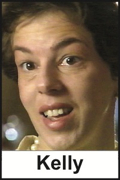Rascals case in brief
In the beginning, in 1989, more than 90 children at the Little Rascals Day Care Center in Edenton, North Carolina, accused a total of 20 adults with 429 instances of sexual abuse over a three-year period. It may have all begun with one parent’s complaint about punishment given her child.
Among the alleged perpetrators: the sheriff and mayor. But prosecutors would charge only Robin Byrum, Darlene Harris, Elizabeth “Betsy” Kelly, Robert “Bob” Kelly, Willard Scott Privott, Shelley Stone and Dawn Wilson – the Edenton 7.
Along with sodomy and beatings, allegations included a baby killed with a handgun, a child being hung upside down from a tree and being set on fire and countless other fantastic incidents involving spaceships, hot air balloons, pirate ships and trained sharks.
By the time prosecutors dropped the last charges in 1997, Little Rascals had become North Carolina’s longest and most costly criminal trial. Prosecutors kept defendants jailed in hopes at least one would turn against their supposed co-conspirators. Remarkably, none did. Another shameful record: Five defendants had to wait longer to face their accusers in court than anyone else in North Carolina history.
Between 1991 and 1997, Ofra Bikel produced three extraordinary episodes on the Little Rascals case for the PBS series “Frontline.” Although “Innocence Lost” did not deter prosecutors, it exposed their tactics and fostered nationwide skepticism and dismay.
With each passing year, the absurdity of the Little Rascals charges has become more obvious. But no admission of error has ever come from prosecutors, police, interviewers or parents. This site is devoted to the issues raised by this case.
On Facebook
Click for earlier Facebook posts archived on this site
Click to go to
Today’s random selection from the Little Rascals Day Care archives….
Click for earlier Facebook posts archived on this site
Click to go to
Today’s random selection from the Little Rascals Day Care archives….
View from 1908: ‘The lawyer alone is obdurate’

iastate.edu
Paul Kix
May 5, 2016
“Psychologists have long recognized that human memory is highly fallible. Hugo Münsterberg taught in one of the first American psychology departments, at Harvard. In a 1908 book called ‘On the Witness Stand,’ he argued that, because people could not know when their memories had deceived them, the legal system’s safeguards against lying – oaths, penalties for perjury, and so on – were ineffective.
“He expected that teachers, doctors, and politicians would all be eager to reform their fields. ‘The lawyer alone is obdurate,’ Münsterberg wrote.”
– From “Recognition: How a travesty led to criminal-justice innovation in Texas” by Paul Kix in the New Yorker (Jan. 18)
Dr. Munsterberg saw clearly the stubbornness of lawyers, even if he may have overestimated the open-mindedness of those other callings.
![]()
Kelly used hard work to survive hard time
Oct. 21, 2011
How would you handle six years behind bars after being wrongfully convicted? Here’s how Bob Kelly did it:
 “In jail (in Chowan County before being found guilty) there was nothing but sitting and waiting. Central Prison was easier – I could work.
“In jail (in Chowan County before being found guilty) there was nothing but sitting and waiting. Central Prison was easier – I could work.
“A warden told me, ‘Whoever kills Bob Kelly will have a trophy. I can put you in lockup, where you’ll be safe.’ But that would’ve meant spending 23 hours a day in a cell. I said, ‘Put me in the general population. I’ve got 12 life sentences, and I’m not going to do my time hiding.’
“But I tried to be smart. It was two years before I went outside in the yard. All I could think of was, if I got in a fight, how would that affect the appellate court?… Only one time did a jailhouse gangster lay his hands on me, and I realized I had to stand up to him to keep it from happening again….
“My first job was janitor in G block. I waxed the floor, emptied the trash, kept it like my home. They don’t allow bleach, because it would get thrown in the guards’ eyes, but I managed to talk a guy in the laundry room out of a bottle. It was great for spraying down the showers. My block was the only one in the whole prison that smelled like Clorox….
“My next job was running the canteen for lockup. The guys who had been there before me had watered down the Cokes and coffee and pocketed the difference. I wanted to run the best canteen I could, so I started giving full measure….
“You know what the other prisoners said? ‘You’re stupid – don’t you know you could be making money?”
Postcard from the bumpy path to exoneration
 Sept. 3, 2012
Sept. 3, 2012
Since its creation by the General Assembly in 2006, the North Carolina Innocence Inquiry Commission has considered more than 1,100 innocence claims, three of which resulted in exonerations. This is from a letter I wrote the Innocence Inquiry Commission requesting that it take up the case of the Edenton Seven:
“I am fully aware that my request falls outside the letter of your mandate. It is of such importance, however, that I believe consideration by the Commission would be both just and appropriate.”
And this is from the response I received from Kendra Montgomery-Blinn, executive director:
“By law the Commission is only permitted to consider claims arising from current convictions. We cannot consider cases in which the conviction was vacated, even if the claimants were not fully exonerated.
“I am familiar with the (Little Rascals) case as I studied it both in college and in law school. In fact, I cited the case in the brief for a 2007 Commission hearing….
“I am sorry that the Commission cannot be of further assistance. The only other option I am aware of is a Gubernatorial pardon. The surviving defendants from the Wilmington 10 case have recently applied for pardons.
“Thank you for contacting the Commission and for continuing to bring attention to this important case and the subject of wrongful convictions. I am proud that North Carolina is first in the nation to have a state-run innocence commission.”
Another door to exoneration is closed, however sympathetically. Others remain.
Footnote: The hearing Ms. Montgomery-Blinn mentions grew out of a 2001 case in Pitt County. Henry Reeves had been convicted of taking indecent liberties with his 6-year-old daughter, Marquita. This passage in the Innocence Commission’s investigative statement caught my eye:
“Barbara Hardy (the child’s mother and the defendant’s wife) stated that when Marquita came out of her sessions with Dr. (Betty) Robertson, Marquita would have gum or little presents, and Marquita would state ‘Look what she gave me for getting the questions right.’
“Mrs. Hardy said that she tried to tell Dr. Robertson that Marquita was a people pleaser and may say things just to be rewarded, but Dr. Robertson said, ‘I believe it happened, and it’s going to court.’
“It is important to note that Dr. Robertson…. provided therapy and evaluations to 23 of the children in (the Little Rascals) case….”
Still rewarding possibly-abused children for “getting the questions right”? Did Betty Robertson learn nothing from the 23 false positives she reported in Edenton?
Betsy Kelly: Still innocent, but no longer believing
 Jan. 7, 2013
Jan. 7, 2013
““When I began this journey almost five years ago, I was a very strong, very optimistic, very believing and very innocent person. As I stand here today, I have become very tired, very disillusioned, very unbelieving but very much the innocent woman I was.
“When I lost my home, my job and business, my worldly possessions – then my husband and friend – I realized that what I had believed in and held onto as truth and justice no longer existed. But with the love and concern and total support of my family, my attorneys and very dear friends, I have come to realize that although prison is some place I do not want to return to, there are many worse prisons to endure out in the free world.
“I can now, for the first time in five years, look my precious daughter in the eyes and tell her that this will all be over soon and that (the) life that we have dreamed about but never dared to believe in is going to come true.
“No one in this courtroom can truly understand why I chose this pathway at this time – but I am at peace with the only true person that matters.”
– From Betsy Kelly’s statement to the court (Jan. 21, 1994), as she entered a no contest plea to 30 counts of child molestation











0 CommentsComment on Facebook